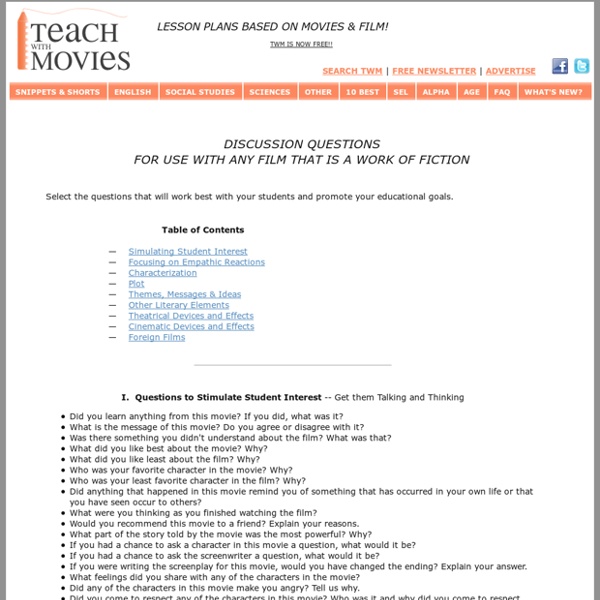The Right Way to Show Movies in Class
I like to think of myself as a proponent of using multimedia in the classroom to better engage students in the curriculum. I’ve amassed a large collection of movies from youtube, teachertube, itunes podcasts, and commercial DVDs that I show in frequent short bursts in the classroom with adults and children to help make my points and show visual examples of what I’m talking about. I think it’s time to clarify how to show movies effectively. 1. Showing movies in class should not be a Friday fun day activity. Okay, I don’t mind if you show them on Friday or even if students enjoy watching them. 2. 3. 4. Content. Delivery. Behavior. 5. 6. 7. 8. 9.
Making the Most Out of Movies in the Classroom
Most administrators will tell you they hate when teachers show movies in the classroom. For the most part, I agree with them. However, as long as teachers are utilizing them correctly, movies and videos can play a valuable role in the education process and can be an important aspect of a teacher’s strategy in providing lesson material to students. Recently, I decided to show a video in my geography classes that I thought did a great job of reinforcing a point that I was trying to make in class. We watched a National Geographic Video about North Korea that did a great job of showcasing absolute dictatorships and extreme isolation. A few ways that you can stay and healthy fit this school year. Learning isn’t as one-way as we tend to think. Our goal-setting teaching strategies to pass along to your students. Our guide to purpose drivel learning, a classroom management technique you... A few classroom management suggestions that can help to reduce a child’s... Making the Movie Engaging
Draw, choose, write or say: Fantastic formative assessments
Formative assessment can be fantastic! Here are options for letting students draw, choose, write and say as a formative assessment tool. (Flickr / Devon Christopher Adams) Formative assessment can be drudgery. Or formative assessment can be fantastic. Teachers use formative assessments to get the pulse of the class, to see how students are progressing. Plenty of digital tools exist to help teachers mix things up. Need some ideas? When you’re done reading, please add your favorite formative assessment tools in a comment at the end of the post! Formative (goformative.com) — Formative lets teachers ask a question (or questions) to students through the students’ devices. Paper by FiftyThree (fiftythree.com/paper) — Paper is a sketching app. Google Drawings (drive.google.com) — Google Drawings lets students add elements to a blank canvas, including text, images, shapes and lines. Kahoot! Plickers (plickers.com) — Don’t have devices for every student? Related
Discussion questions for films? - EnglishClub TEFL Forums
Now I'm in a more relaxed mode, I'll talk about why I like using films and then I'll share my comprehension and discussion questions for Little Miss Sunshine. I hope others will share their thoughts in time and if they write any material to use with a film they'll remember this thread and post it here! The main reasons I show whole films in class (about once every 2-3 weeks) are to surprise the students by doing something different, and to give them something to think and then talk about. The choice of the film depends on whether I want it to be motivational (Little Miss Sunshine), pure entertainment as a reward for something (we watched Blues Brothers the day after my last class took the FCE), or just for discussion (Dr. Strangelove, the Breakfast Club). I showed Little Miss Sunshine (with English subtitles) to my Intermediate class on Friday. Why is Frank in the hospital? After it's over I ask the group how they feel... happy/sad/angry/didn't like the move? Discussion questions:
Wayback Machine
Donor challenge: A generous supporter will match your donation 3 to 1 right now. Triple your impact! Dear Wayback Supporter, We ask you only once a year: please help the Internet Archive today. You may not know it, but we’re an independent, non-profit website that the entire world depends on. We protect reader privacy. We ask you only once a year: please help the Internet Archive today. We ask you only once a year: please help the Internet Archive today.
20 Questions to Consider When Watching a Film
Focus: The Art and Soul of Cinema These question are based on those in Focus: The Art and Soul of Cinema (Damaris, 2007). They are intended to help you organise your thinking as you watch a film. First response How did the film make you feel? Structure What causes the major turning points in the narrative come? Characters How would you describe the main characters? Worldviews What is the view of reality? About the Author Photo credit: © Bartosch Salmanski.
Lesson plans & curriculum guides: PDP guide
Search the Library Catalogue, using the keyword lesson plan or teacher guide Here are some examples of resources containing ideas or materials for lesson planning: resource binders - e.g. Math makes sense 1 [print] textbooks - e.g. TeachBC - start here! Not sure if the materials you've found are copyright-cleared for educational use in the classroom? General/multidisciplinary BCTF Provincial Specialist Associations List of specialist association websites, which can be an excellent source of subject-specific teaching information and resources. Arts education Association of British Columbia Drama Educators Provincial specialist association of the BCTF BC Art Teachers Association Provincial specialist association of the BCTF BC Dance Educators' Association Provincial specialist association of the BCTF British Columbia Music Educators' Association Provincial association of the BCTF CyberMuse Art education website for teachers produced by the National Gallery of Canada. English language arts
Movie Sheets - Teacher Submitted Movie Worksheets for the Classroom



